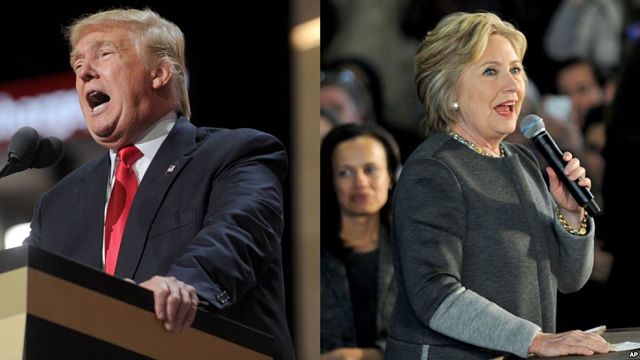 Republican presidential candidate Donald Trump, left, and his Democratic opponent Hillary Clinton. (AP)
Republican presidential candidate Donald Trump, left, and his Democratic opponent Hillary Clinton. (AP)
Voice of America
As the first U.S. president with familial ties to Africa, President Barack Obama has left a mark and a legacy on the continent. Among his signature achievements is Power Africa, which aims to add 60 million new electrical connections to light up the continent.
Obama also launched the Young African Leaders Initiative (YALI), which mentors and funds projects for ambitious young people. He has also helped expand trade to the continent and has visited sub-Saharan Africa four times, more than any other U.S. president.
But as Africans closely watch this year’s presidential race, they are wondering what the policy of either party’s candidate — Democratic nominee Hillary Clinton or Republican candidate Donald Trump — would look like toward the region.
African policy has not been a priority topic on the campaign trail for either candidate, but each has advisers who offer hints at how they would approach Africa as president.

President Barack Obama addresses a Young African Leaders Initiative gathering in Washington, Aug. 3, 2016. (AP photo)
Clinton offers continuation
Tom Daschle, former Senate majority leader and a Clinton supporter, said Clinton’s relationship with the continent runs deep, especially with the Clinton Foundation, which has worked to fight AIDS and supports educational initiatives.
“Hillary and Bill Clinton have really made a commitment to Africa and the relationship between our continents for a long time,” Daschle said. “The Clinton Foundation has been extremely active in Africa, and so we think it really represents a new chapter for the relationship. We are very really bullish and very optimistic about what it could mean.”
He also said Clinton would have a very different perspective on immigration than her opponent, who has pledged to halt immigration for Muslims and for people coming from areas of the world with high instances of terror.
“I think it’s night and day when it comes to immigration,” Daschle said. “We believe in immigration. We think that immigration is really the reason why we celebrate the diversity and the strength that is America. And the more we can embrace immigration, the more we believe we have an opportunity to help create stability around the world, in addition to enhancing their own diversity.”
Trump’s counterterrorism efforts
Trump has made little mention of Africa in his campaign appearances.
The closest Africa has come to being a hot topic was when Trump mispronounced the nation of Tanzania when speaking about terrorism. Additionally, some animal-rights activists have protested the fact that two of Trump’s sons go on hunting trips to shoot big game in Africa.
Walid Phares, a Lebanese-American foreign policy analyst and adviser to the Trump campaign, said he has met with ambassadors from about 50 countries and addressed their concerns.
“We confirmed that a Trump administration would show solidarity with Africa,” Phares told VOA.
He said Trump will be eager to form security partnerships with African countries to combat shared enemies such as extremist groups. Many African countries, including Libya, Mali and Tunisia, have seen their security situation erode, Phares said, adding that he believes they are hungry for a stronger commitment to fighting terror from the White House.
“Africans like Obama, for sure, but his foreign policy was not good for Africans and Sahel countries feel they were not part of this policy,” Phares said. “They would rather go now with a Trump administration. Without security, there is no economy.”
2016 party platforms
Each of the two parties mention policy toward Africa in official party platforms introduced and voted on at the party conventions.
The Democratic Party platform promises to improve capabilities in crisis response and provide protection of civilians with an emphasis on women and girls.
They promise to continue Obama’s initiative to combat wildlife trafficking and make counterterrorism efforts a priority.
“We will work to end the reign of terror promulgated by Boko Haram, al-Shabab, AQIM and ISIS,” the platform reads.
Terrorism is similarly important to the Republican Party, which states in its platform: “We urge governments throughout the continent to recognize this threat to their own people. We support closer cooperation in both military and economic matters with those on the front lines of civilization’s battle against the forces of evil.”
Other GOP promises include the extension of health care support throughout the continent until 2025. The initiatives include President George W. Bush’s signature program to offer AIDS relief, known as PEPFAR, and funding to fight AIDS, tuberculosis and malaria.
Witney Schneidman, a nonresident fellow at the Brookings Institution and adviser to Clinton on Africa, believes that no matter who wins, both parties can find common ground in their shared interest to help the continent.
“Over the last two administrations, Bush and now Obama, there’s been a tradition of bipartisanship when it comes to Africa,” Schneidman said.
He pointed to the 2000 passage of the African Growth and Opportunity Act that received strong bipartisan support, which the President’s Emergency Program For AIDS Relief did as well. Obama’s efforts in Africa have similarly enjoyed broad support from both parties, he said.
“I would expect into the next administration that many of these programs will continue and this bipartisan consensus will be sustained,” Schneidman said.
—
Join the conversation on Twitter and Facebook.

























